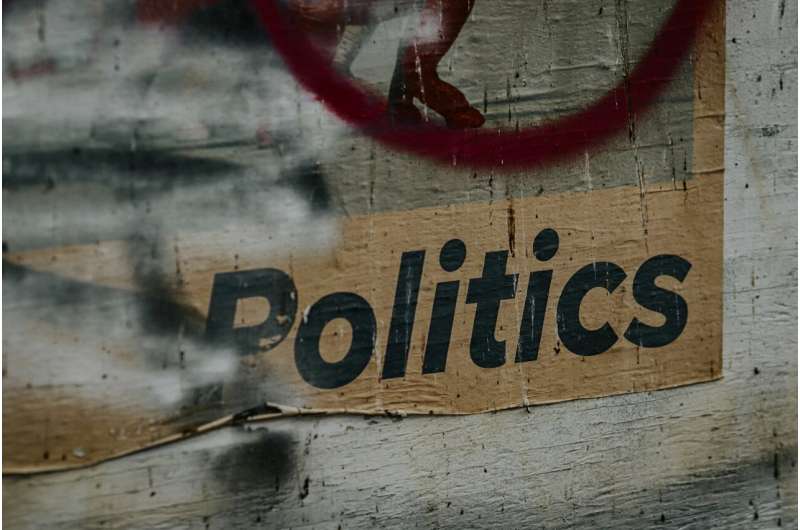This article has been reviewed according to Science X's editorial process and policies. Editors have highlighted the following attributes while ensuring the content's credibility:
fact-checked
trusted source
written by researcher(s)
proofread
Nostalgia in politics: Study sheds light on how (and why) parties appeal to the past in their election campaigns

Have you ever felt nostalgic when thinking about the past? Then you are not alone. According to survey research, around two-thirds of the European public feel nostalgic.
Nostalgia is defined as a predominantly positive emotion associated with recalling memories of important events, usually experienced with people who are close to us. And these feelings may not be limited to personal experiences: in politics, nostalgia may refer to a longing for a more prosperous past or lost cultural traditions.
Take the Italian far-right party, Fratelli d'Italia (Brothers of Italy), which currently leads the country's coalition government. The party's 2022 manifesto contained numerous nostalgic references.
One standout claim was that the "natural resources and artistic heritage of the nation are an inheritance to be guarded and enhanced." Another was that "the elderly represent our history: a heritage of experiences, skills, talents that have helped to the birth and growth of our nation."
Such statements draw upon a shared pride in the nation's past to knit together a compelling narrative.
Increasingly, there is evidence that nostalgic feelings can affect our political views. Recent studies on the Netherlands and Turkey support these findings.
Nostalgic citizens are less satisfied with the government and more likely to vote for radical right parties. In a new publication, we examined the extent to which political parties capitalize on nostalgic rhetoric in their campaigns by analyzing 1,650 election manifestos published by parties across 24 European democracies between 1946 and 2018.
Election manifestos, by definition, mostly contain promises for the future. They are a list of pledges a party promises to implement should it be part of a future government. But we also discovered that on average, about 10% of a party manifesto is dedicated to discussing the past.
Central and Eastern Europe: Nostalgia reigns
We found that parties in central and eastern Europe and southern Europe are more nostalgic than those in northern and western Europe. The average manifesto in central and eastern Europe included 44 nostalgic sentences per 1,000 sentences, while in western and northern Europe, the average manifesto contains fewer than half that.
It's also notable that many of the most nostalgic parties across the continent are classified as nationalist by researchers at the Manifesto Project. Examples of highly nostalgic nationalist parties include All for Latvia, the Estonian People's Union, Golden Dawn in Greece, Sweden Democrats and the French National Rally (formerly the National Front).
That said, although nationalists are most prone to nostalgia, nostalgic rhetoric is evident across the political spectrum and was found in eight out of ten manifestos in some form or another.
It also appears to be cultural conservatism rather than economic conservatism that makes a party more likely to use nostalgia. Nostalgic rhetoric addresses cultural issues much more frequently than economic topics.
This is revealing about nostalgia as a device. Parties seem to strategically employ nostalgic references and choose to focus on either the past, present or future when talking about a given topic depending on the wider political context.
Other research shows that parties tend to frame education, economic and environmental policy with a future-related focus, while security, immigration and defense policy are more often referred to with an emphasis on the past.
Why it matters
There is nothing inherently wrong with nostalgia, but the use of nostalgia in political campaigning is, by definition, strategic. And its prevalence in the documents we examined suggests parties clearly see it as a useful tool.
But a focus on the past should not replace a critical evaluation of a party's plans for the future. A nostalgic sentiment, such as "our historic market towns, cathedral cities, and unspoiled countryside are the envy of the world," is not an electoral pledge.
Its use could therefore be seen as a device to obfuscate when a party lacks concrete solutions or proposals for the future of the nation they seek to govern. Given our propensity towards nostalgia, it could also be used as a narrative device that might provide cover for parties seeking to introduce potentially controversial policies.
Research on policies such as gun control, immigration and social justice show voters can be swayed in directions they might not normally take if they are presented with nostalgic messaging at the same time.
If socially conservative parties have identified it as a powerful rhetorical device, perhaps socially progressive parties could find a way to use it for more positive reasons as well. Since a significant portion of society has nostalgic feelings, such messages are unlikely to disappear from political discourse anytime soon.
Provided by The Conversation
This article is republished from The Conversation under a Creative Commons license. Read the original article.![]()





















